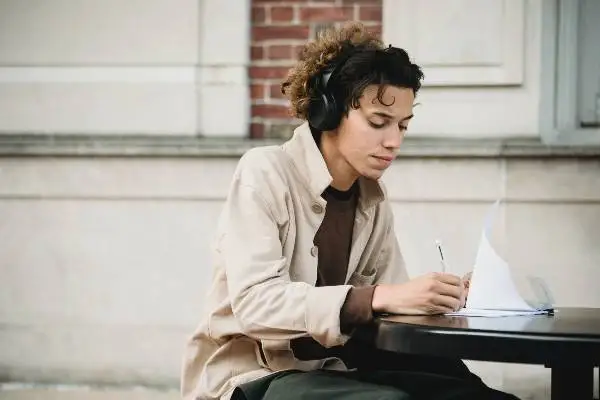One of the most important parts of the songwriting process is learning how to write verses that tie an entire song together. However, writing verses doesn't always come easy, and it can take a lot of practice to transform song ideas into fleshed-out bangers that listeners revisit time and time again.
Thankfully, we've put together a step-by-step guide on how to write effective verses from scratch. Below, we'll showcase the most important elements of a verse, what makes a strong verse, and the basic framework for crafting your first verse. Let's jump into it!
What Is a Verse and How Does It Work In A Song?
In its simplest terms, a verse serves as the main story of a song . These are the longer sections that a listener hears in between the coveted choruses. Typically, verses are played out over strong, repetitive chord progressions with varying lyrics and strong rhyme schemes. A powerful verse leads into a great chorus and supports the overall idea of a song.
You'll usually find a verse before and after the chorus sections, though many songs divert from the typical song structure. Here's a typical example of verses within a song structure so that you can get a sense of how this music element works:
Verse
Pre Chorus
Chorus
Verse
Chorus
Bridge
Chorus
Songs can have more or fewer verses based on the needs of the composition. Every verse is different, but most songs incorporate verses with a repetitive melodic structure, rhymes, and lyrics designed to connect deeper with your listener.
A verse may include a short repeated phrase or hook, but usually, these tools are saved for the chorus. The verse may not be the catchiest section of a song, but it carries the story which is incredibly important -- Listeners aren't able to connect to the fun, the sonically-pleasing feel of a vibrant chorus without the vulnerable lyrics most often showcased in a verse.
Examples of Verses In Songs
Perhaps the best way to identify a verse in a song is to hear one! In the John Lennon classic "Imagine" the opening verse is as famous as the chorus:
"Imagine there's no heaven
It's easy if you try
No hell below us
Above us, only sky
Imagine all the people
Living for today"
Another excellent example of a verse is in Toto's "Africa". This famous verse incorporates an ABAB rhyme scheme to add to its appeal:
I hear the drums echoing tonight
But she hears only whispers of some quiet conversation
She's coming in, 12:30 flight
The moonlit wings reflect the stars that guide me towards salvation
As you can see, there are plenty of ways to write strong verses utilizing different chord progressions, rhyme schemes, and melodic phrasings! It all comes down to creating verses that connect with the rest of the song and the listener.
How To Write A Verse
While there's no one right way to write a verse, sometimes having a general guideline can make it easier for you to start writing verses on your own. Here's a basic outline of how you can write your first verse that captures your listener's attention.
- Figure Out Your Song's Story
- Determine Your Starting Point
- Write, Don't Edit!
- Incorporate Rhyme
- Think About the Chorus
- Test Your Verse To Music
- Edit As Needed
- Put the Full Song Together
- Rinse and Repeat

1. Figure Out Your Song's Story
One of the best songwriting tips for creating a strong verse let alone composition is to figure out your message first. Even if your song isn't designed to carry a deep emotional arc or story, you can still think about what phrases you want to include in your song, or what the main idea of your tune is.
You can even outline your song's story with a beginning, middle, and end. This way, you'll have a clear idea of what ground you need to cover in the first verse, second verse, and everywhere in between! It can be helpful to create a brainstorm of different song ideas and narrow down your list to the strongest concept. Whatever it is, commit to it and then proceed to the next step!
2. Determine Your Starting Point
Every song has to start somewhere but not all songs are made in the same way. With that in mind, open yourself up to whatever feels most comfortable to you and record it in some way. Have a melody in mind? Record it in your voice memos app. Did the first line come to you? Jot it down and worry about editing it later. Have a great drum idea? Put it down in your DAW !
Oftentimes, the path to a great song isn't necessarily linear. You can have multiple or no ideas come at ones which can feel like spontaneous sparks of inspiration. However, choosing a place to start can help out immensely.
Pick a place to start so that you have a more clear roadmap of where to go next. Remember that the next time you write a song your process might be extremely different. Trust whatever makes sense at the moment and feel free to experiment.
3. Write, Don't Edit!
One of the most important songwriting tips to keep in mind during the beginning of the songwriting process is to let yourself write without judgment so that you don't kill an idea before its inception. Allow yourself to truly let your creativity out as much as possible.
You can put your editing hat on later, but for now, let s the words flow. Once you've penned your first verse, make your way to the second verse. Try to get your raw thoughts as soon as possible so that you can move into a more comfortable analytical stage of the process.
4. Incorporate Rhyme
Once you have an idea for a line whether it's lyrically or melodic , try to take it a step further and establish some form of rhyme scheme. Rhyme schemes in music allow songs to have a stronger connection with the listener since they are oftentimes more memorable.
You might have to change the structure of your lyrics to fit your rhyme scheme, but it's definitely worth it!
5. Think About the Chorus
Verses of a song don't just serve themselves, they create a context for the full musical composition. Therefore, it's important to think about how your verse sets a listener up for the chorus or pre-chorus. In this case, it may be wise to try writing a draft version of the other sections of your song once you've penned a basic outline for the first verse.
How does your verse lead into the chorus? Does the chorus answer or explain a question prosed in a verse? Think about the relationship between these two different song elements so that you're able to form a song that's as cohesive as it is catchy.
6. Test Your Verse To Music
Sometimes a verse can work on paper, but it doesn't fit quite right with the rest of the song. So, once you've written out the draft lines of your verses, choruses, and overall song structure. It's time to put your song to music and rhythm.
Doing so may help you realize which words may need to be cut, or which lines could use a tune-up in order to fit the cadence of your song . At the very least, sing your verses over a repeated, in-time chord progression to get a sense of the pacing. It doesn't hurt to record this practice as well so you can revert back to your recordings in the editing process.
7. Edit As Needed
Not all great songs are as effortless as they seem. Now that you have your outline put to music, it's time to break out that red ink. Don't be afraid to edit your verse writing to better fit the music -- You can update your lyrics to better fit the message of your music for example. You might want to edit the music behind your lyrics in other cases.
8. Put The Full Song Together
Once you have all of the basic elements in place, it's time to evaluate the full composition. Play your song in full and take note of how the verse relates to the parts of the rest of the song. Does the verse serve the story of your track? Does the song feel cohesive from one part to the next? If so, you've just created a full piece of music! Congratulations!
9. Rinse and Repeat
The best way to improve your skills is to learn how to write a song and do it over and over again. There's no substitute for practice, and making music, a lot of it is the only way to become a better songwriter. Musicians oftentimes make the mistake of giving up after they create one song that wasn't up to their standards.
However, professional musicians know that good songs are just as inevitable as bad songs -- it's just a matter of putting in the work to get to the good ones. Continue to critically listen to strong verses in your favorite songs, and most importantly, take the time to write your own!

How To Write A Verse FAQs
Are you still struggling to learn how to write a verse? Here are some common song verse questions and answers to help expand your understanding of the process.
How do you start a verse?
When you start a verse, you are creating the opening premise of your song. Therefore, you can think of it as the opening lines to your story. Figure out the main idea of your song and work backward. What line can grab your listener's attention and set them up for the rest of your song?
How do you end a verse?
The end of your verse should be centered around creating a seamless transition into the chorus. You’ll want to end your verse on a line that leaves the listener anticipating the melodic and lyrical context of a chorus, though there’s no one right way to end a verse.
What is 1 verse of a song?
The verse of a song is the lyrically focused, longer sections that surround a track’s choruses. Each verse of your song should further the track’s narrative, helping to build a story and cohesive arc throughout your song. Verses usually contain an even amount of lines to accommodate the rhyme scheme.
What makes a good verse?
A good verse comes in many forms. That being said, an effective verse usually adds to the song’s story and holds a continuous yet catchy melody. Great verses are designed to help the chorus shine even more in its own light.
How long should a verse be in seconds?
There isn’t a set amount of time that a verse should be in order to be effective -- For instance, look at Don Mclean’s “American Pie” or Billy Joel’s “Scenes from an Italian Restaurant”. Instead, focus on your verse conveying your song’s main idea and creating a platform for the chorus.
Should I write chorus or verse first?
Great songwriters will tell you that there’s no perfect formula for writing a song. Whether the chorus or verse comes to you first, go for it! Instead of focusing on which comes first, try to redirect your efforts to the relationship between the two essential song elements.

Can a song have 3 verses?
A song can have 3 verses -- It can also have 1, 2, or 5! There isn’t a set number of verses for a song to be effective. Just make sure that your verse serves your song’s purposes. Verses should help the listener connect on a deeper level to your music and is a great place to showcase your lyrical abilities. Heck, Taylor Swift has a new version of "All Too Well" with 5+ verses alone.
How do you write a short verse?
In order to write a short verse, you could try singing at a higher tempo or with more stretched-out phrases. You can also try limiting yourself to a certain number of lines in order to inspire a shorter verse. Experiment with different lyrics and remember, there’s no one right way to make a song.
How long should your first verse be?
Your first verse should be as long as you need it to be. There isn’t a “correct” length of a verse, so long as it tells the story of your song and sets the listener up for what’s to come in the chorus.
Learning how to write strong verses can be challenging. However, as previously mentioned, once you write your first verse, it's that much easier to write your second verse. As a musician, it's up to you to work past your initial fears in order to improve your songwriting skills.
Hopefully, this article brought you one step closer to writing an effective verse that captures the feeling and main message of a song. Enjoy the process of songwriting!





